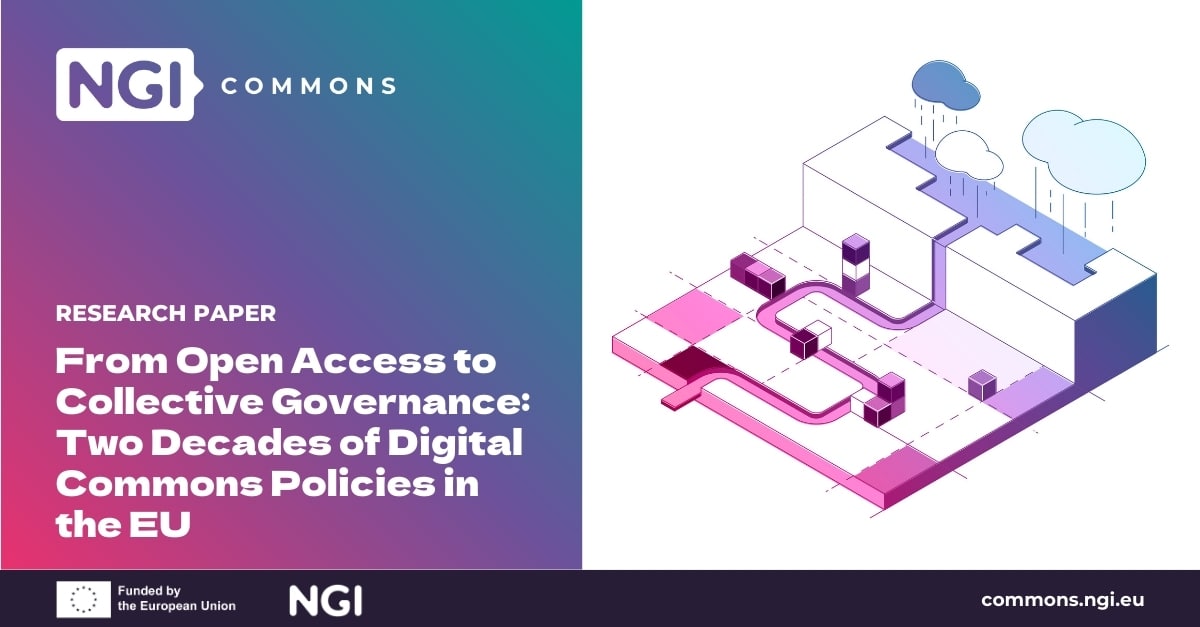Research Paper
At a time when the EU seeks to redefine its industrial strategy, this publication provides insights into the policies that have supported Digital Commons over the past 20 years. Unlike previous studies that have examined subsets of Digital Commons, such as open source software (OSS) or Open Data, this report offers a holistic perspective. It integrates various resources and initiatives under the broader framework of Digital Commons, presenting a comprehensive view of how these policies have evolved.
As Europe grapples with geopolitical tensions, the threat of economic sanctions, and political interference, securing digital sovereignty has become a central challenge for the region’s competitiveness and the future of its democracy. This urgency, highlighted by Mario Draghi’s alarmist report, is further underscored by the establishment of a new portfolio for Henna Virkkunen, Commissioner for Tech Sovereignty, Security, and Democracy, reflecting the growing convergence of these issues.
This report, a contribution to the NGI Commons project, aims to support the development of a strategic agenda for investments in Digital Commons. Positioned at the intersection of the EU’s current challenges, Digital Commons and public digital infrastructures address both the need for research and innovation to achieve technological catch-up and the imperative of autonomy—the ability to collectively define and shape Europe’s technological trajectory. The report illustrates a significant policy shift in the EU over the past two decades. Initially, efforts centered on open access, emphasizing transparency and the free circulation of knowledge, data, and software to drive economic and societal benefits. Public administrations adopted OSS to modernize operations, reduce costs, and enhance transparency. However, in the past decade, policy priorities have evolved to address the governance and collective management of digital infrastructures, driven by concerns over digital sovereignty and the growing dominance of a few global platforms. The report underscores Europe’s slow integration of OSS into industrial strategies, aligning with global trends in regions like Asia, and highlights innovative governance frameworks that emphasize public-civic-private cooperation. In the face of pressing challenges and limited public resources, these policies underscore the need to harness the potential of Digital Commons to build public digital infrastructures.
The report concludes with the following recommendations for future policies:
- Mainstreaming Digital Commons into European policies: Embedding the culture and practices of Digital Commons across member states and aligning them with existing policy frameworks and indicators.
- Investing in technologies and the institutions that sustain them: Supporting both the technological foundations and the governance structures necessary for the long-term sustainability of Digital Commons.
- Scaling impact by increasing financial support and pooling resources: Addressing fragmentation through resource integration and fostering collaboration across member states and stakeholders.
- Mobilizing Digital Commons to achieve the green transition: Strategically aligning Digital Commons with environmental policies to foster innovation in sustainable technologies and systems.
From Open Access to Collective Governance: Two Decades of Digital Commons Policies in the European Union
The text of this document is based on a report submitted to the European Commission as a deliverable of the NGI Commons project. This preliminary version is published as a contribution to ongoing discussions. The official deliverable will be made available on the NGI Commons website once it has been formally accepted.
NGI Commons (Open Source and Internet Commons for Europe’s Digital Sovereignty) project is funded by the European Union’s Horizon Europe research and innovation programme under Grant Agreement number 101135279. This work has received funding from the Swiss State Secretariat for Education, Research, and Innovation (SERI). Views and opinions expressed are however those of the author(s) only and do not necessarily reflect those of the European Union. Neither the European Union nor the granting authority can be held responsible for them.

